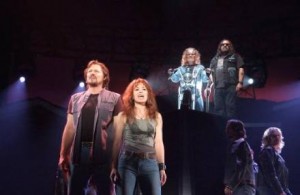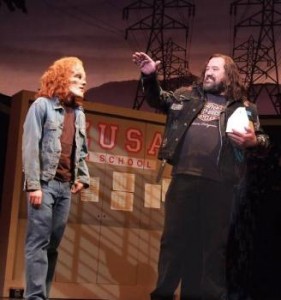
The Pasadena Playhouse stage is lit from behind by a dozen or more white
spots shining like headlights at the audience, illuminating a tribe of bikers led
by the imposing figure of big, longhaired, bearded Dozer. “Come Along For
The Ride,” they sing to the music and lyrics of Hall of Fame legends Barry Mann
and Cynthia Weil, and what a ride it’s going to be. Surrender your urge to
nitpick and let your heart lead you along the brief but brilliant highway that is
the life of Rocky Dennis, immortalized by Eric Stolz and Cher in the 1985 film
Mask. This is Mask as musical, and if the story was rich and rewarding already
as biopic, it is even more so with Mann and Weil’s songs added, and the stellar
performances of Michelle Duffy, Greg Evigan, Michael Lanning, and the
raveworthy debut of Allen E. Read as Rocky.
Rocky Dennis lived but 16 years, and we follow his path over just one of them,
his last, but what a light he shone on the world while he was here. Just as Stolz
performed acting miracles in the movie, unrecognizable behind the mask-like
makeup that was the real-life Rocky’s lionesque head, so newcomer Read
gives a performance that is sure to be remembered as one of the year’s most
luminous and moving.
We meet Rocky as he is about to enter a new school just 20 minutes from the
Playhouse, in 1977 Azusa, CA. School principal Mr. Simms takes one look at
Rocky’s face and recommends that he attend a “special” school, despite
Rocky’s Jr. High report card that has him ranked in the top 5% of his class.
Simms is no match, however, for the force of nature that is Rusty Steinberg
Dennis, Rocky’s Brooklyn-born biker mom, who in “The Way I See It,” lets Simms
know in no uncertain terms that if his school teaches math and science, those
are the only “needs” that need be considered. “Don’t worry, Mr. Simms,”
reassures young Rocky. “I look weird, but otherwise I’m real normal. Everything’ll
be cool.”
And cool they are, and cool he is.
When mom and son, accompanied by a team of bikers, are about to be told
Rocky’s life expectancy by a newbie physician, they beat him to the punch in
the rousing “Three To Six Months.” This is the diagnosis that Rocky (suffering
from craniodiaphyseal dysplasia) has been getting since day 1, and the tribe
tell the good doctor how much can be accomplished in three to six months.
This is the way Rocky has lived his life, making every minute count.
Students at Azusa High don’t know what to make of the teenager with a
head twice the normal size, but when he is the only one in class who can
answer a question about the Trojan War, which he does in the sing-along “Do
It For Love,” the kids in his class are won over by this young man with a song on
his lips and sunlight in his eyes.
Rocky’s dream for this year in which he turns 16 is to make the “run” to Sturgis,
South Dakota, a yearly event for bikers all around the U.S., and biker chief
Dozer (a bulldozer of a man if there ever was one) sings that riding a chopper
across the highways that lead from Azusa to Sturgis takes you about as “Close
To Heaven” as you’ll ever get. All Rocky needs to do, in order to join the tribe
on the run, is to prove himself a man. That is his mission in this, his 16th year of
life.
Rocky’s biggest supporter, and biggest headache, is his biker/druggie mom
Rusty, portrayed here by the dazzling Michelle Duffy, who tops her recent turn
in Kiss Me Kate and even her Ovation-winning starring role in last season’s Can-
Can with a performance so rich and layered and a rock-star ready voice that
just begs for its own debut CD.
Rusty Dennis has had a drug problem for as long as Rocky can remember, and
nothing her straight-arrow son does seems enough to make her stop. If Rusty
could kick the habit, maybe biker hunk Gar, who’s been like a father to Rocky,
might stick around for once. We know that he has never seen “A Woman So
Beautiful” as Rusty, but whenever Rusty’s drug problem gets too much to
handle, Gar bolts. He’s back now, and more than ever Rocky wishes he would
stay.
Will Rocky find a way to get his mother off drugs? Will Gar stick around long
enough for the three of them to become a real family? Will Rocky find a
girlfriend who will love him for his inner beauty, and even see the beauty in his
mask of a face? Will he prove himself a man and make the run to Sturgis? Will
he even survive another “three to six months,” or will these be his last? Those
who’ve seen the movie know the answers, but even if this is a musical (a la
Carousel or The King And I) where you know from the start that you’ll be
bawling your eyes out at the end, oh what a ride you’ll be taking to get there.
Anna Hamilton Phelan’s book follows her Mask screenplay fairly closely (if I
recall correctly), and Cynthia Weil’s lyrics often take the place of Phelan’s film
dialog, as when movie Rusty tells Rocky that “You can be a chicken shit and
die or be a mensch and keep makin’ yourself well” and Weil manages to rhyme
the words to fit a song. It should come as no surprise that Weil knows how to
write a pop song lyric. She’s been doing it from way back when Eydie Gormé
sang her musical advice to “blame it on the Bossa Nova” or the Righteous
Brothers sang about someone who’d “lost that lovin’ feelin” or Mama Cass
sang that we should all “make our own kind of music” and “sing our own
special song.” If her lyrics are at times a bit too “pop” for a musical, that’s a
minor quibble and I’ve already said I wouldn’t nitpick.
Barry Mann’s music is in a class by itself. Remember Lynda Ronstadt and Aaron
Neville’s “Don’t Know Much,” Dolly Parton’s “Here You Come Again,” the
Righteous Brothers’ “Soul And Inspiration,” James Ingram and Linda
Ronstadt’s “Somewhere Out There,” and just about everyone’s “On
Broadway”? Barry Mann wrote the music to them all, and here he proves
himself as capable of writing a hook at age 69 as he did when he wrote his first
hit song at 20. In addition to the Mask songs already mentioned, there’s the
lovely “Beautiful World,” in which Rocky sings to blind camper Diana (his first
love) about how to “feel” the colors that sighted people see; “After
Goodbye,” sung by the campers as their magical summer is about to end; and
one of the most gorgeous melodies Mann has ever written, “Planet Vulkturn,”
Rocky’s song about a place where he is no different from anywhere else. Just
thinking about Allen Read singing this exquisite song in his haunting voice and
I am tearing up even as I write this.
Director Richard Maltby, Jr. (Broadway’s Ain’t Misbehavin’ and Fosse, among
many others) brings Rocky and Rusty’s story to vivid life, aided by a super-
talented cast of 20. TV (and Broadway)’s Greg Evigan is a charmer of a rolling
stone as Gar, and possessed of a husky belt of a voice. Michael Lanning recalls
a slimmer Meat Loaf (remember “Two Out Of Three Ain’t Bad”?) as Dozer, the
mountain of a biker with a heart of gold, and pipes to match.
Mask’s supporting cast is truly talent-packed. Diane Delano does powerhouse
work as biker Retread and schoolteacher Ms. Mendez, Sarah Glendening
charms as blind teen Diana, Mark Luna is very funny as slightly dimwitted T-
Bone, dance captain Heather Marie Marsden is gorgeous as ever as Zephyr,
Suzanne Petrela is a touchingly real Angel (the hooker hired by Rusty to speed
Rocky on his path to manhood), and James Leo Ryan is funny as always in a
pair of roles (drug dealer John the Baptist and the biker Rabbi who performs
triple duty in Act 2). The stellar cast is rounded out by Alec Barnes, Brad
Blaisdell, Katy Blake, Ryan Castellino, Chris Fore, Krysten Leigh Jones, Shanon
Mari Mills, Ethan Le Phong, Jolene Purdy, and Matthew Stocke (who disappears into four very different roles).
Mask is not a “dance show” per se, but Patti Colombo’s fine musical staging
has the cast moving to a 70s beat, and musical director/conductor/
keyboardist Joseph Church leads a rocking 8-piece band from the pit. Robert
Brill’s scenic design is marvelously versatile, built upon a turntable stage,
transforming itself into Rusty’s apartment, a doctor’s office, a school, a carnival
house of mirrors, a summer camp, etc., all the while the San Gabriel Mountains
loom from behind and power lines hang from above. Maggie Morgan’s
costumes are a potpourri of styles, from 70s polyester and flared jeans to
comparatively timeless bikers’ gear. David Weiner’s lighting design is truly
spectacular, and Peter Fitzgerald and Carl Casella’s sound design mixes music
and voices to rock concert perfection. Michael Westmore deserves special
mention for his makeup design, complemented by Bob Kretschmer’s Rocky
wigs.
Despite having begun this review by having advised audience members to
surrender their urge to nitpick, I’m going to pick a few small nits anyway in the
form of constructive criticism. (This is, after all, a show still in evolution.) There
are moments when Phelan’s dialog reveals needed information a bit too
obviously. A headband is not enough to distinguish Delano’s biker and
schoolteacher’s look. With “Angel’s Song” cut from the scene between Rocky
and Angel, the scene now comes across like one from a straight play, whereas
this being a musical, it cries out for a song to replace some of the dialog.
Since Mask, like any world premiere musical, is not yet frozen in its final form,
hopefully the writers and director will continue to fine-tune it, perhaps
incorporating some of these suggestions.
But don’t let the fact that Mask today and Mask a year from now may not be
entirely the same show deter you from attending. I’ve already seen it twice,
and both performances were greeted by cheers and standing ovations. I
guarantee that word of mouth for Mask will be great. In fact, having reread
what I’ve written here, I’ve decided that twice is not enough for me, so you
may well run into me at the Playhouse. I expect to be coming back for more!
Pasadena Playhouse, 39 South El Molino Avenue, Pasadena.
www.Pasadenaplayhouse.org
–Steven Stanley
March 25, 2008
Photos: Ed Krieger




 Since 2007, Steven Stanley's StageSceneLA.com has spotlighted the best in Southern California theater via reviews, interviews, and its annual StageSceneLA Scenies.
Since 2007, Steven Stanley's StageSceneLA.com has spotlighted the best in Southern California theater via reviews, interviews, and its annual StageSceneLA Scenies.







 COPYRIGHT 2024 STEVEN STANLEY :: DESIGN BY
COPYRIGHT 2024 STEVEN STANLEY :: DESIGN BY